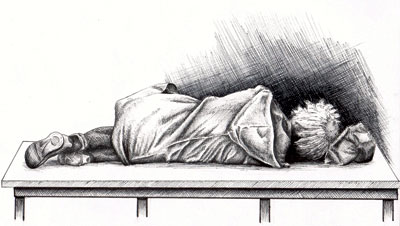All Nonfiction
- Bullying
- Books
- Academic
- Author Interviews
- Celebrity interviews
- College Articles
- College Essays
- Educator of the Year
- Heroes
- Interviews
- Memoir
- Personal Experience
- Sports
- Travel & Culture
All Opinions
- Bullying
- Current Events / Politics
- Discrimination
- Drugs / Alcohol / Smoking
- Entertainment / Celebrities
- Environment
- Love / Relationships
- Movies / Music / TV
- Pop Culture / Trends
- School / College
- Social Issues / Civics
- Spirituality / Religion
- Sports / Hobbies
All Hot Topics
- Bullying
- Community Service
- Environment
- Health
- Letters to the Editor
- Pride & Prejudice
- What Matters
- Back
Summer Guide
- Program Links
- Program Reviews
- Back
College Guide
- College Links
- College Reviews
- College Essays
- College Articles
- Back
The Benefits of Sleep
Sleep is the best way to let your mind and body relax after a stressful day at work or school. Sleep relaxes the muscles and energizes the body for the day ahead. Sleep improves memory and clears the mind of any unnecessary waste that slows down learning. Sleep is very important, that’s why everyone sleeps. Certain things can affect your sleep. For example: Sleeping positions and technology. These things can drastically change whether or not you have a restful rest.
Sleeping Positions
When laying in bed, the position you lie in can affect the way you sleep. Sleeping on your back could be the best position to sleep in because it supports the spine and levels the neck to its natural position. When the neck and back are aligned, it opens up your air passages and makes it easier to breath. Sleeping on your side may feel comfortable, but it causes pressure to your side and restricts the blood flow in this part of the body which is bad for your health. This is why when you wake up sometimes your arm is numb. Sleeping on you stomach could be the worst position to sleep in because it causes Sleep Apnea. Sleep Apnea is a sleep disorder which can last a few years or be lifelong. Sleep Apnea causes shortage of breath and on and off breathing. This position flattens the natural curve of the spine and can also cause back pain and strains the neck.
Studies show that sleep can change your mood. Since sleeping on your back benefits your spine, you sleep better and don’t wake up tired. When you are not tired you are more productive and happier throughout your day. Since sleeping on your stomach or side can cause pain in the back or sides, you don’t sleep well. When you don’t sleep well you wake up tired because your body has been uncomfortable the entire night.
Technology
Most people use electronics such as their cell phone before they go to bed. According to The National Sleep Foundation, 95 percent of people surveyed admitted to using electronic devices prior to sleeping. One might think that using your device before going to bed is harmless, but checking that last text can have negative effects on your brain. About 10 percent of Americans leave their ringers on while sleeping, and every text or notification will make a sound. These sounds cause a disturbance in sleep patterns and will also keep you awake.
It takes longer to fall asleep after checking your cell phone because the blue light on the screen mimics the light of the sun and makes the brain think it is still daytime. The light will make the brain think it is light outside and try to keep you awake, just like sunlight. This is called the blue light affect. “Sunlight contains red, orange, yellow, green and blue light rays and many shades of each of these colors, depending on the energy and wavelength of the individual rays (also called electromagnetic radiation). Combined, this spectrum of colored light rays creates what we call ‘white light’ or sunlight.” (All About Vision) If you must check your cell phone prior to going to sleep, there is a “night shift” setting that will counteract the blue light and make it easier to get to sleep.
Improving Sleep
Because sleep is extremely important to everyone's well being, there are things you can do to improve your sleep. Avoid naps during the day. Naps throw off your sleep pattern and makes you less tired at night. Try to avoid coffee or any caffeinated drinks before going to bed. The caffeine will stay in your body for at least 6 hours and make it very difficult to rest. Read before going to sleep. Reading settles your brain and eyes before you sleep. Meditate or do yoga before going to sleep. Meditation and yoga calms and relaxes your muscles and brain and makes it easier to sleep. Sleep is crucial to the human body, so getting a good night's rest is the best thing for everyone.

Similar Articles
JOIN THE DISCUSSION
This article has 0 comments.
